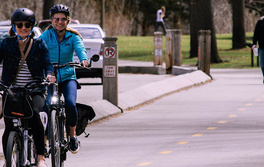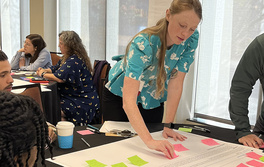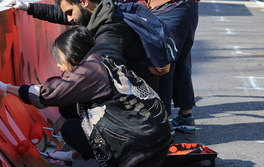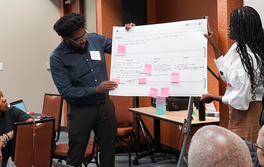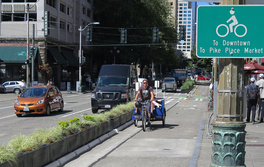
STATEMENT: Congress Must Prioritize Access in Surface Transportation Provisions of The Moving Forward Act
The following is a statement from Harriet Tregoning, director of NUMO, the New Urban Mobility alliance, regarding the INVEST in America Act, now incorporated as Division B of H.R. 2, or The Moving Forward Act.
“Right now, the United States House of Representatives is poised to consider a reauthorization bill that contains an unprecedented investment in public transit and even explicitly requires states to measure the success of their transportation systems based on whether people can access everyday needs such as jobs, groceries, health care and education.
“The surface transportation provisions of The Moving Forward Act are a strong first step toward creating a safer, more sustainable and just transportation system. As Congress continues to work toward a final reauthorization bill, it is critical we focus on the fundamental ability of every person living in this country to equitably access the civic and economic life of their communities.
“Common sense tells us the goal of transportation is to move people so they can safely, efficiently and affordably access the services and resources they need. Incredibly, however, we fail at realizing that goal daily. In the U.S., car ownership often is a prerequisite to upward economic mobility. Without a car, your access to daily needs and services is severely limited, which is especially troubling considering the vast imbalance in car ownership across race. For instance, only 5% of white individuals have reported living in a household without a car, versus nearly 20% of Black individuals.
“Gaping disparities in access and longstanding health and economic hardships have only been exacerbated by recent events. The COVID-19 pandemic sent transit systems into financial freefall and curtailed critical services, worsening access for essential workers, who disproportionately are people of color or from lower income communities. The rising movement against racism ignited by the murders of George Floyd, Ahmaud Arbery, Breonna Taylor and countless others has brought international attention to the injustices faced by communities of color in our nation’s very streets and raised painful questions about how our transportation system has failed to protect and support Black and Brown lives.
“Let’s say it clearly: the current transportation system enforces structural and systemic inequities, disenfranchising people based on race, gender, age, ability and economic status. If we are to spend half of a trillion dollars over the next five years, we must invest in a system that empowers vulnerable communities and increases their ability to safely and affordably access health services, shop for groceries, pick up prescriptions, vote, get to work and go to school.
“This reauthorization sets the stage for this sort of fundamental change by shifting how federal policy values and measures the success of our transportation system. This bill could be a fulcrum for a wide range of investments that determine whether and how those who struggle most have the life-changing access to opportunity, safety, civic engagement and economic mobility that so many of us take utterly for granted. Let’s get it right this time.”
Please direct media inquiries to Madlyn McAuliffe at madlyn@numo.global.
NUMO, the New Urban Mobility alliance, is a global organization that channels tech-based disruptions in urban transport to create joyful cities where sustainable and just mobility is the new normal. Founded in 2019 as an outgrowth of the Shared Mobility Principles for Livable Cities, NUMO convenes diverse allies and leverages the momentum of significant revolutions in mobility to target urban issues — including equity, sustainability, accessibility and labor — impacted by the shifting transportation landscape. NUMO is hosted by WRI Ross Center for Sustainable Cities.
